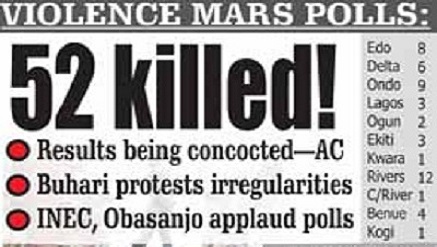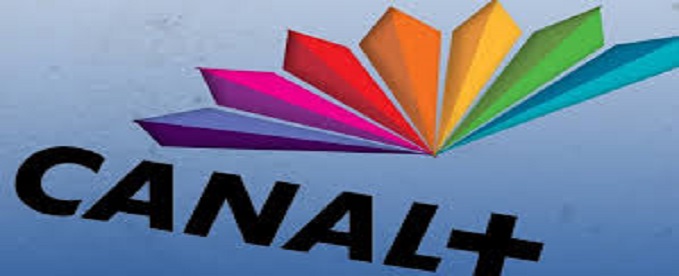General News
Election Tensions Raise Fear of Nigeria’s of Break-Up

As Nigeria approaches its most divisive and closely fought election since the end of military rule in 1999, its leaders are having to reassure voters that Africa’s most populous nation will remain in one piece, according to Reuters.
The Feb. 14 vote pitting President Goodluck Jonathan, a Christian popular in his southern oil-producing Niger Delta region and in the east, against former military ruler Muhammadu Buhari, a Muslim favored in the north and religiously mixed southwest, is already proving violent, with the electorate in Africa’s biggest economy more polarized than for decades.
“Despite the much-vaunted fear that our nation may not survive the elections … I remain optimistic that we have … the maturity to rise above the challenges,” Senate President David Mark told parliament last week.
“Our nation will not disintegrate after the elections.”
Ever since 1914, when Britain carved Nigeria out of a swathe of West Africa that was home to diverse peoples speaking more than 500 languages, it has been dogged by the question of how viable it is as a unified nation state.
Reuters said that, most analysts say that even if serious bloodshed follows the election, as many expect, the worst-case scenario of a break-up of a country of 180 million people remains unlikely.
“Nigeria has an enormous capacity to absorb risk,” the International Crisis Group’s Africa director Comfort Ero said. “While there are significant concerns about the elections, we are not predicting break-up.”
However, she added that the republic was “in deep trouble, probably more than at any time since the end of military rule … or even the civil war.”
The last time a bit of Nigeria tried to secede, it triggered the 1960s Biafra civil war in which more than a million people died. After that it seemed Nigerians were better off together.
But as the election cycle has hotted up, some have floated the idea of division, and Boko Haram insurgents controlling territory the size of Belgium in the northeast are waging an increasingly bloody campaign for a breakaway Islamic state.
Separately, dozens of people die every month in ethnic violence in the Middle Belt, where the largely Christian south and mostly Muslim north meet across a patchwork of minority groups that are likely to be split between the two candidates.
“Nigeria is bursting at the seams with ethno-religious … problems waiting to explode,” columnist Bayo Oluwasanmi wrote in the African Herald Express, a local daily, last month.
“Competition in the coming 2015 presidential election could break the already tattered ties that keep Nigeria whole.”
That is probably hyperbole but there are signs the elections could trigger violence that may not be as easy to quell as in 2011, when Buhari’s loss to Jonathan triggered three days of riots in the north that killed 800 and displaced 65,000.
Besides regional and ethnic differences, Buhari is also a protest vote for many who say Jonathan has failed to tackle insecurity and corruption, Nigerians’ two biggest complaints, and who was seen as tough on both when he ruled in the 1980s.
The pair hugged as they signed a peace pact last week, but clashes between thugs from the ruling People’s Democratic Party (PDP) and Buhari’s opposition All Progressives Congress (APC) have marred campaign rallies, and the rhetoric remains poisonous and sometimes tinged with religion.
Last year the PDP accused the APC of a “devilish plot” to impose an “Islamic agenda” on Nigeria, a dangerous appeal to religious sentiment, while Jonathan has played up his Christian identity, forging ties with hardline evangelical pastors.
PDP state governor Ibrahim Shema had to retract a speech in November in which he described APC supporters as “cockroaches” and urged the crowd to “crush them”, a chilling echo of Hutu militia radio broadcasts during the 1994 Rwandan genocide.
On the other side, APC governor Rotimi Amaechi said this month that if the poll was not fair, the opposition would set up a “parallel government”, as happened after a disputed election in Ivory Coast in 2010.
“If they deny Buhari victory, it could mean civil war because both sides are so dug in,” prominent northern opposition politician Mohammed Junaidu told Reuters.
The 2010 Ivory Coast election did spark a civil war but the country was already militarily divided, which Nigeria is not.
In Kenya in 2007, a disputed election triggered three weeks of ethnic bloodshed that killed 1,200, a toll that would be far higher in Nigeria where there are many more people and weapons.
Ultimately what makes these polls so dicey is that they are a genuine contest, said John Campbell, a former U.S. ambassador to Nigeria and fellow at the Council on Foreign Relations.
By running in 2011 Jonathan broke an agreement with northern elites, in their minds at least, that it was the north’s ‘turn’ to field a president. Now such regional deals are in tatters.
“In the past there has been a kind of consensus among the people who run Nigeria … Elections at the presidential level were largely predetermined,” Campbell said. “What we are talking about now are real elections, with a polarized electorate.”
General News
PalmPay Supports Nigeria Police Force National Cybercrime Centre 2025 Cybersecurity Awareness Walk

PalmPay, a Nigerian leading digital banking platform, supported the Nigeria Police Force National Cybercrime Centre (NPF-NCCC) during its Cybersecurity Awareness Walk held in Abuja as part of activities marking the 2025 Cybersecurity Awareness Month.

Themed “Secure Our World,” the event brought together key stakeholders from law enforcement, regulatory bodies, and the private sector to promote public awareness on cybersecurity, financial fraud prevention, and safe online practices.
PalmPay joined other participants in advocating for stronger public vigilance and safer digital engagement, reaffirming its commitment to supporting national efforts that enhance cybersecurity and consumer protection.
Speaking during the event, PalmPay’s Managing Director, Mr Chika Reginald Nwosu, commended the Nigeria Police Force National Cybercrime Centre (NPF-NCCC) for its efforts in combating cybercrime and protecting consumers. He emphasised the need for continued collaboration across sectors to build a safe and secure payment ecosystem for all Nigerians.
“We commend the NPF-NCCC for its proactive leadership in driving cybersecurity awareness,” said Nwosu. “At PalmPay, we are committed to supporting initiatives that promote digital safety and foster trust in Nigeria’s growing digital economy.”
At the event, PalmPay was commended for its outstanding efforts in strengthening regulatory engagement and advancing consumer protection initiatives across the fintech industry.
The partnership underscores PalmPay’s ongoing commitment to promoting cybersecurity awareness, consumer protection, and fraud prevention as part of its mission to create a safer digital financial ecosystem in Nigeria.
PalmPay is a leading digital banking platform driving financial inclusion and economic empowerment in underserved emerging markets. Through its secure, user-friendly, and inclusive suite of financial services, PalmPay empowers individuals and businesses with tools to manage and grow their money.
PalmPay offers a comprehensive range of products, including mobile payments, savings, and micro-insurance via its app and mobile money agent network.
General News
Fidelity Bank Salutes Air Peace for Flying Nigeria’s Flag to Heathrow

Fidelity Bank Plc has congratulated Air Peace on the successful launch of its maiden direct flight from Lagos to London Heathrow, describing the milestone as a significant achievement for Nigeria’s aviation sector and a testament to the power of indigenous partnerships.

The commendation was delivered by Dr. Nneka Onyeali-Ikpe, managing director of Fidelity Bank, during a special event held in Lagos to celebrate the airline’s expansion into the European market.
“This is not just a win for Air Peace, but a win for Nigeria,” Onyeali-Ikpe said. “It reflects the strength of home-grown businesses and the impact of strategic financial support in enabling national champions to thrive on the global stage.”
Nigeria CommunicationsWeek reports that Fidelity Bank has played a pivotal role in Air Peace’s growth, providing early financial backing and advisory services that helped the airline become the largest carrier in West Africa. The bank continues to support Air Peace through payment processing and other financial services
The launch of the London route marks a new chapter for Air Peace, which now joins a select group of African airlines operating direct flights to Heathrow.
The development is expected to boost tourism, trade, and connectivity between Nigeria and the United Kingdom.
Speaking at the event, Allen Onyema, Chairman of Air Peace, expressed gratitude to Fidelity Bank for its unwavering support and reaffirmed the airline’s commitment to excellence and service.
“This partnership has been instrumental in our journey,” Onyema said. “We are proud to fly the Nigerian flag across international skies.”
Industry stakeholders present at the event praised the collaboration between the two companies as a model for sustainable business growth and national development.
General News
After MultiChoice Buyout, Canal+ Eyes Full Ownership of Showmax

Canal+, French media giant, is reportedly eyeing the full takeover of Showmax, the African streaming platform jointly owned with MultiChoice Group.

This followed its recent push to expand across the continent’s digital entertainment market.
The move comes after Canal+ completed its acquisition of MultiChoice to strengthening its hold on Africa’s pay-TV and streaming ecosystem.
With Showmax being a key growth asset under the partnership, industry analysts say a full takeover could give Canal+ end-to-end control of content production, distribution, and subscription revenue in multiple markets.
The acquisition would also align with Canal+’s broader strategy to rival global streaming giants such as Netflix and Amazon Prime Video by leveraging African content demand and localized storytelling.
According to RipplesNigeria, Ayo Balogun, Media and Telecoms Analyst, CardinalStone Partners, while reacting to the move, said: “Canal+’s full acquisition of Showmax would mark a decisive step in consolidating Africa’s digital media value chain.
“With MultiChoice now under its control, Canal+ can fully integrate content, distribution, and streaming into a single monetizable ecosystem—something we’ve not seen before on this scale in Africa.”
Thandiwe Mokoena, Senior Media Strategist, Johannesburg, added: “This move gives Canal+ strategic dominance in both the pay-TV and OTT spaces. It positions them not only as a regional player but also as a continental gatekeeper for premium African content. The competitive pressure on Netflix and Amazon Prime Video in Africa will rise sharply if this takeover goes through.”
Financial markets are closely watching how the potential consolidation could reshape Africa’s media landscape, particularly in terms of valuation, competition law, and licensing rights.

 Telecom2 days ago
Telecom2 days agoUNICEF, GSMA Unite with Partners to Launch Africa Taskforce on Child Online Protection to Safeguard Children in the Digital Age

 Broadcasting2 days ago
Broadcasting2 days agoNCC Calls for Professional Guidelines on Software Use, Support for Copyright Enforcement

 E-Business2 days ago
E-Business2 days agoNOTAP to Crackdown on Unregistered Technologies in Nigeria

 General News2 days ago
General News2 days agoFG to Train One Million Youths under TVET for Entrepreneurship, National Development

 Broadcasting2 days ago
Broadcasting2 days agoMultiChoice to Delist from JSE after Canal+ Takeover

 E-Financial2 days ago
E-Financial2 days agoSEC Puts Nigeria’s Cryptocurrency Transactions in One Year @ Over $50Bn

 E-Financial2 days ago
E-Financial2 days agoPolaris Bank restates support for SMEs, commissions EveryDay Supermarket in Yenagoa

 E-Financial1 day ago
E-Financial1 day agoLotus Bank Drags 45 Banks to Court over Alleged ₦1.1Bn Fraudulent Withdrawals


























